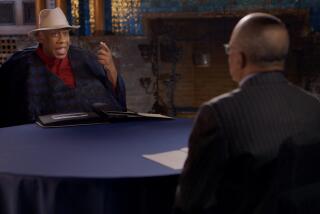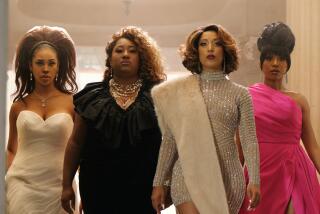‘FRONTLINE’ TO FOCUS ON U.S. IN CENTRAL AMERICA
- Share via
NEW YORK — United States involvement in Central America and the Caribbean during this century will be the focus of an unusual four-part edition of “Frontline,” public television’s weekly documentary series.
“Crisis in Central America” is scheduled for broadcast on public television stations, including KCET Channel 28 in Los Angeles, April 9-12 for one hour each night.
“This is a history long overdue on television, coming at a time when we as a nation are making crucial decisions about our involvement in the region,” “Frontline” executive producer David Fanning said by telephone from Boston’s WGBH-TV, where the series is produced.
He said the $2-million project was inspired by WGBH’s highly acclaimed 13-part series “Vietnam: A Television History,” seen on public television two years ago.
“We have tried to take the ‘Vietnam’ series’ stance: standing back and asking what happened, instead of moralizing and passing judgment,” said Austin Hoyt, executive producer for the Central America special. Hoyt was one of the WGBH producers who worked on the Vietnam series, as did most of the Central America producing team.
Hoyt said the special will break down this way:
--”The Yankee Years,” tracing U.S. involvement in the region from the building of the Panama Canal until 1954.
--”Castro’s Challenge,” following Fidel Castro’s guerrilla movement in Cuba in the 1950s through his consolidation of power some 20 years later.
--”Revolution in Nicaragua,” detailing that country’s history from the Somoza dictatorship through the Sandinista regime now in power.
--”Battle for El Salvador,” examining the roots of revolution in that country in the 1930s, through current efforts on the part of the United States to bring about a Western-style democracy under President Jose Napoleon Duarte.
Hoyt said participants from “all sides” of the region’s volatile history have been interviewed on camera for the four-part special. They include U.S. State Department officials from as far back as the 1920s, Communists and other revolutionaries from the region, representatives of the Reagan Administration, including U.S. Ambassador to the United Nations-designate Vernon Walters, and former and current Central American leaders, including Duarte and Nicaraguan President Daniel Ortega.
Not included, however, is Fidel Castro, who declined to be interviewed, Hoyt said.
“Frontline” correspondent Judy Woodruff will set each of the four programs in context and provide updates on current news from the region, Hoyt said.
More to Read
The complete guide to home viewing
Get Screen Gab for everything about the TV shows and streaming movies everyone’s talking about.
You may occasionally receive promotional content from the Los Angeles Times.






